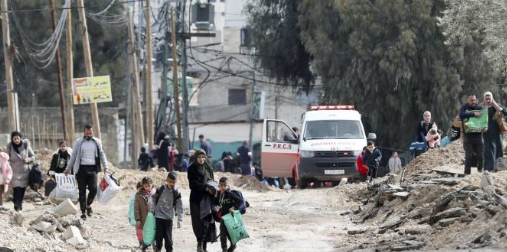New York (Web Desk): The forced displacement of Palestinian communities in the northern part of the occupied West Bank is escalating at an alarming pace, the UN agency that assists Palestine refugees, UNRWA, has warned.
The forced displacement of Palestinian communities in the northern West Bank has intensified, with alarming rates of people being uprooted from their homes.
Since the onset of Operation Iron Wall on January 21, the situation has become more dire, especially with its widespread effects on Palestinian refugee camps.
Initially targeting Jenin camp, the operation expanded to other areas, including Tulkarm, Nur Shams, and El Far’a camps, leading to the displacement of over 40,000 refugees.
This operation, which marks the longest military action in the region since the second intifada, has significantly altered the fabric of these communities.
Since mid-2023, large-scale Israeli military operations have resulted in thousands of Palestinians being displaced.
Many of these communities in the northern West Bank have been left unable to return to their homes due to the extent of the destruction, perpetuating a cycle of displacement.
The combination of repeated operations and an increasingly hostile environment, characterized by the use of advanced weaponry, airstrikes, and armored bulldozers, has turned these areas into no-go zones for many of the refugees.
The military tactics, a direct result of the ongoing conflict in Gaza, have led to widespread destruction and further displacement.
At the same time, armed Palestinian groups have increasingly resorted to using improvised explosive devices within refugee camps, including near key civilian structures and UNRWA facilities.
Violent confrontations between these armed groups, Palestinian forces, and Israeli troops have escalated the situation, further destabilizing an already fragile environment.
Since December 2024, the conflict has only intensified, particularly around the Jenin camp, exacerbating the suffering of the displaced population.
UNRWA, the UN agency dedicated to supporting Palestinian refugees, has expressed grave concern over the worsening conditions, calling for the protection of civilians and infrastructure.
The agency condemned the use of collective punishment tactics and highlighted the emptiness of Jenin camp as a tragic reminder of past events during the second intifada.
The growing humanitarian crisis has only been compounded by a recent shift in Israeli policy.
On January 30, new laws were introduced that effectively cut off UNRWA’s ability to operate within Israeli-controlled areas, creating significant barriers to delivering aid and raising alarms about the safety of refugees and humanitarian workers.
With these restrictions in place, the agency is no longer able to maintain contact with Israeli authorities, severely hindering its ability to address civilian suffering or advocate for humanitarian access.
The ongoing violence, coupled with the failure to deliver much-needed aid, has resulted in substantial civilian casualties, with at least 40 people reported dead since January 21.
International agencies, such as the UN Office for the Coordination of Humanitarian Affairs (OCHA), continue to support the affected Palestinian population by providing essential services, including cash assistance to families in need.
However, the challenges of reaching those displaced by the conflict, especially with continued military operations, remain immense.
This worsening situation underscores the urgency of addressing the humanitarian crisis and ensuring that civilians are afforded protection under international law.
As the conflict continues, the international community faces the difficult task of responding to the immediate needs of displaced families while seeking a long-term resolution to the ongoing conflict.


